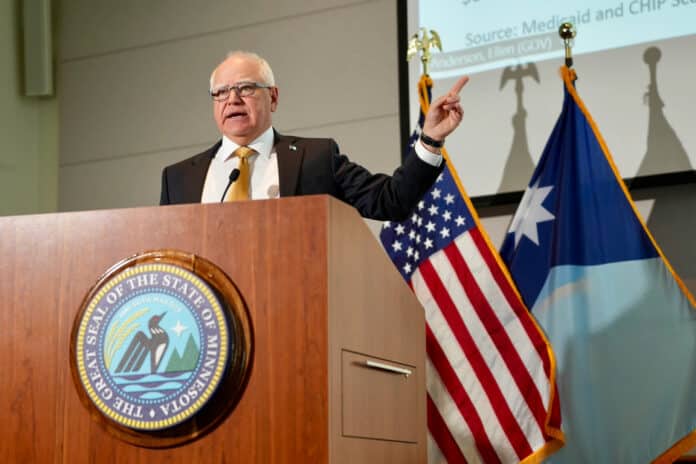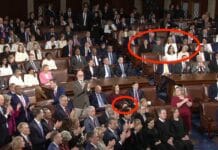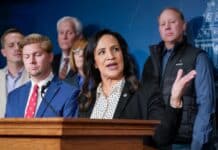
Gov. Tim Walz made a 0.075% cut to the state sales tax rate the “shiny object” of his nearly $66 billion two-year budget proposal he unveiled at the Minnesota Capitol on Thursday.
But the two-term DFL governor’s plan would also expand the base of taxable services—which would generate hundreds of millions of dollars in new revenue over the next four years.
That was enough for Republican leaders in both the House and Senate to give the pitch a thumbs down.
“Yeah, it’s a hard no from us on any tax increases,” the Minnesota Senate Republican Caucus posted on social media shortly after Walz’s budget proposal press conference.
Speaker of the House Lisa Demuth said in a post on X: “There will be no tax increases this session. Period.”
Walz, the one-time Democratic vice-presidential candidate who was focused on defeating Donald Trump just two months ago, packaged his “sales tax cut” partly as a preventative measure to potential tariffs that he said may be implemented by the incoming Trump administration, and partly as a “historic move” to bring more “fairness” to the tax system.
“For the first time in Minnesota history, we are reducing the sales tax,” Walz said at the outset of his hour-long budget unveiling. “And those are things that are going to impact people directly, and thinking about that if there are changes on the federal level around tariffs, those are going to be felt by Minnesota families. We are going to take a proactive move to make that first time we’ve ever enacted a sales tax decrease.”
Walz’s proposal comes on the heels of a one-percent increase to the sales tax in the Twin Cities metro counties that he signed into law in 2023, and a retail delivery fee of 50 cents on purchases of $100 or more. It’s also just two years removed from a 38-percent increase to the state budget that Walz signed into law.
Republicans say Walz’s proposed sales tax revision amounts to a tax increase
Currently, Minnesota has a 6.875% state sales tax rate on taxable goods and services. That means that consumers pay $68.75 in state sales taxes for every $1,000 they spend. Under Walz’s proposal, a 0.075% sales tax cut, consumers would save a total of 75 cents on that same $1,000 they spend—or 7.5 cents per $100 spent. But Walz’s proposed sales tax revision also includes what he calls “closing the loopholes” on existing business-related service exemptions.
Walz’s proposal would have Minnesotans pay state sales taxes for the first time on banking, legal, brokerage and accounting services, which are currently exempted. That element of Walz’s state sales tax pitch isn’t novel. In 2013, then-Gov. Mark Dayton proposed expanding the state sales tax to business-related services. But after receiving criticism from the business community, he backed off the idea.
When all is said and done, Walz’s proposal to expand the sales tax base of taxable services would increase the amount of state sales taxes collected by $185 million in FY 2025-27 and by $235 million in FY 2028-29.
Demuth, a three-term Republican from Cold Spring, said any budget proposal “that raises taxes on Minnesotans and cuts funding for long term care is not a budget that values the people of Minnesota.”
“Democrats already used their one-party control to raise taxes on Minnesotans by more than $10 billion, and spent us into a looming deficit,” Demuth said. “Any tax increases are off the table. House Republicans will push for a responsible budget that makes life more affordable for families, not one that raises their costs and hurts our seniors.”
The Speaker’s words have some teeth, as Republicans in the Minnesota House of Representatives currently hold a 67-66 advantage over Democrats. And even if an upcoming special election for House District 40B ends up seeing a Democrat fill the seat, the respective parties will still be tied at 67 members apiece—which means Democrats won’t have enough members to pass a budget bill unilaterally. In the Senate, the DFL and GOP are split 33-33, as a special election to replace the-late Sen. Kari Dziedzic is about to get underway.

Senate Republican Leader Mark Johnson said Walz’s budget proposal missed the opportunity “to get back to responsible spending, lowering taxes, and helping every Minnesotan get essential services they need to live in their community and secure their future prosperity.”
“Republicans will stand firm against budgeting tricks that raise fees and taxes on regular Minnesotans,” he said.
Flanagan appears with Walz for first time since before Nov. 5 election
Even Lt. Gov. Peggy Flanagan, who appeared with Walz at his press conference on Thursday, acknowledged that at this stage of the budget process, what the executive branch proposes usually isn’t what the legislature and governor end up agreeing to in May.
“I am under no illusions that this first budget that we roll out, this initial volley, will be what we end up with at the end of the legislative session,” Flanagan said. “I think there is an opportunity for us to really work together, to work together across the aisle. I fully expect that is the spirit that the governor and I will be entering into as we go into this legislative session.”
When asked by members of the media how she feels about Walz during their first public appearance together in months, following rumors of a growing rift between them, she said, “You want me to address how I feel about Gov. Tim Walz?”
“I feel pretty great,” Flanagan said. “I think he looks sharp. I am here today because we have done incredible work over the last six years, and my plan is to ensure that we continue to do incredible work together over the next two years.”
Walz was also joined Thursday by Minnesota Management and Budget Commissioner Erin Campbell and Department of Revenue Commissioner Paul Marquart, who helped him outline the highlights of his budget proposal, which they said would leave $2.1 billion on the bottom line in the current budget period and $355 million in the next.
Walz also said his proposal aims to “curb spending growth” in the areas that are driving Minnesota’s projected $5.1 billion deficit.
Hank Long
Hank Long is a journalism and communications professional whose writing career includes coverage of the Minnesota legislature, city and county governments and the commercial real estate industry. Hank received his undergraduate degree at the University of Minnesota, where he studied journalism, and his law degree at the University of St. Thomas. The Minnesota native lives in the Twin Cities with his wife and four children. His dream is to be around when the Vikings win the Super Bowl.










